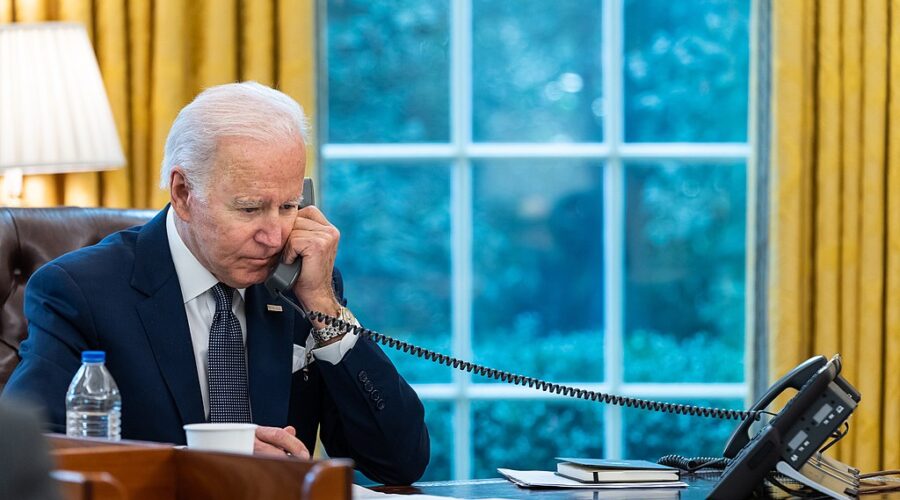The United States is reportedly pressuring Ukraine to start negotiating with Russia. Although the Kremlin desperately needs a ceasefire agreement that would help it save face, Kyiv is unlikely to make any concessions to Moscow. Is a lasting peace deal between the two countries possible?
Right after Russia launched the invasion of Ukraine, the Kremlin immediately started peace talks with Ukrainian officials. As a result, in early April, Russian forces completely withdrew from around Kyiv. According to Russian President Vladimir Putin, such a “goodwill gesture” was a product of the deal the two sides reached in Istanbul.
“Ukraine altered its stance on negotiations with Russia as soon as Russian troops withdrew from Kyiv”, Putin stressed on October 14.
Ukraine, unlike Russia, is not run by political dilettantes. It did not take too long for its leaders to realize that Russia is weak, and that Moscow’s unilateral “goodwill gestures” – from Kyiv, through the Snake Island, to the grain deal in Istanbul – are a sign of the Kremlin’s weakness. Thus, Ukraine is presently refusing to hold any talks with Russia until Moscow withdraws all of its troops from the Eastern European country.
The only thing that could force Ukraine to change its approach regarding negotiations with the Kremlin is pressure from the West, namely from the United States. Rumors are flying that the US is pushing Kyiv to the negotiating table. There are fears in Ukraine, and also among certain Western structures, that the Republicans could eventually block American financial and military aid to the war-torn country, which could have a negative impact on the Ukrainian Armed Forces. On the other hand, there is speculation on various Russian Telegram channels that the Kremlin could withdraw its troops from Kherson, and establish a new front-line along the Dniepr River, in an exchange for a ceasefire agreement with Kyiv.
Even if Russia and the Western-backed Ukraine eventually make such an arrangement, there is no guarantee that a truce will hold. Despite the Minsk Agreements that Moscow and Kyiv signed in 2014 and 2015, the Donbass war went on for years, and it escalated on February 24 when Russia launched the full-scale invasion. Therefore, a new ceasefire deal is unlikely to lead to a lasting peace agreement between the two nations. It will, however, give Kyiv more time to prepare for another round of fighting that might result in recapturing more territories.
Russia, for its part, will not be able to use a truce to change its military and political approach regarding Ukraine. As long as Putin, his oligarchs and officials remain in power, there will be no crucial changes in Russian strategy vis-à-vis the Ukraine war. The Russian Federation, under Putin, has proved to be a highly dysfunctional and an extremely corrupt country that is rotten from the inside. As such, it will undoubtedly continue suffering humiliations and defeats not only in Ukraine, but in the global arena as well.
If Russia makes another “goodwill gesture” and withdraws its troops from Kherson, sooner or later Ukrainian Armed Forces will cross the Dnieper River, a move that could undermine Russian positions not only in the Kherson and Zaporizhzhia regions, but also in the Donbass, namely in Mariupol, as well as in Crimea. In spite of that, the Kremlin continues preparing the Russian population for a potential fall of Kherson, even though a loss of the city could have catastrophic consequences for the Russian military, and would also represent a huge political defeat for the Russian political leadership.
Still, Moscow continues insisting on negotiations with Ukraine and the United States. Reports suggests that Yuri Ushakov, a foreign policy adviser to Putin, and Security Council Secretary Nikolai Patrushev, spoke with the US National Security Adviser Jake Sullivan in an attempt to “avoid further escalation in the Ukraine war”. Meanwhile, a growing number of Russians expect their country to conclude a peace deal with Ukraine, while the vast majority of the Ukrainian population say that their nation should fight until victory. In other words, the Kremlin is fighting to reach a deal, while Ukraine is fighting to win the war.
Under such circumstances, the West has no reason to halt arms supplies to the Eastern European country, especially since its people is ready to live without electricity, heat and water in order not to be part of the so-called Russian world. Even if the Republicans, or certain structures within the Biden administration, force Ukraine to sign a ceasefire deal – which at this point does not seem very probable – such a move will only postpone an inevitable escalation of the conflict.
In the long-term, the Ukraine war can end only if one of the two parties involved agrees to sign a de facto capitulation. As long as the West continues providing Kyiv with military support, chances for Ukraine to lose the war will remain minimal. A potential but very improbable partition of the Eastern European country, or Ukraine recognizing Russia’s annexation of its territories, can come only as a result of a wider geopolitical deal between the Kremlin and its American partners. But why would the US, now that Russia is literally on its knees, make any concessions to Moscow?
Image: President Biden held a telephone call with Ukrainian President Zelenskyy in December 2021 by White House

